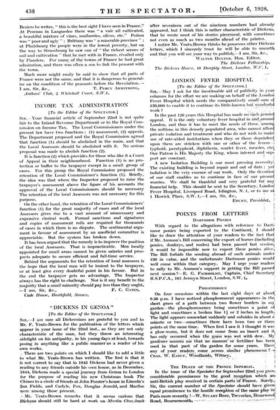INCOME TAX ADMINISTRATION [To the Editor of the SPECTATOR] Sin,—Your
financial article of September 22nd is not quite fair to the Inland Revenue Department or to the Royal Com- mission on Income Tax. The Local Commissioners under the present law have two functions : (1) assessment, (2) appeals. The Department proposed and the Royal Commission agreed that function (1) should be abolished in the main, and that the Local Assessors should be abolished with it. No serious proposal was made to abolish function (2).
It is function (2) which provides for those who like it a Court of Appeal in their neighbourhood. Function (1) is no pro- tection or buffer to the taxpayer except in a small group of cases. For this group the Royal Commission proposed the retention of the Local Commissioner's function (1). Briefly, the idea was that where the Inspector proposed to raise the taxpayer's assessment above the figure of his accounts the approval of the Local Commissioners should be necessary The retention of the local Assessors was not necessary for this purpose.
On the other hand, the retention of the Local Commissioners' function (1) for the great majority of cases and of the local Assessors gives rise to a vast amount of unnecessary and expensive clerical work. Formal sanctions and signatures and copies of assessment rolls are required for thousands of cases in which there is no dispute. The sentimental argu- ment in favour of assessment by an unofficial committee is appreciable. But the system has broken down.
• It has been argued that the remedy is to improve the position of the local Assessors. That is -impracticable. Men locally Appointed for small areas cannot be given salaries and pros- pects adequate to secure efficient and full-time service.
Behind the arguments for the retention of local assessors is the hope that the local men will be lenient to the taxpayer, or at least give every doubtful point in his favour. But in the end the taxpayer gets no advantage. The Inspector always has the right to challenge. Nor is it any benefit to the majority that a small minority should pay less than they ought.






















































 Previous page
Previous page